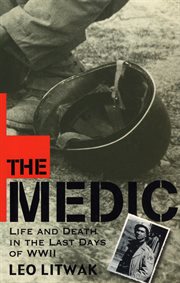Nonfiction
eBook
Details
PUBLISHED
Made available through hoopla
DESCRIPTION
1 online resource
ISBN/ISSN
LANGUAGE
NOTES
Leo Litwak was a university student when he joined the Army to fight in World War II, "a na've, callow eighteen-year-old son prepared to join other soldier boys being hauled off to war." In 1944 he found himself in Belgium, in the middle of the waning European war, a medic trained to save lives but often powerless to do much more than watch life slip away. It was hard fighting that took Litwak and his rifle company into the heart of Germany at the close of the war. But Litwak learned there was more to war than fighting, more to understand than maps and ammunition. In the final months of the war, he watched the men in his company tenderly serve food at a Passover seder for a dozen brutalized Jewish women newly liberated from slavery. He watched those same men torture and execute defenseless German soldiers. He fell in love at the Moulin Rouge in a scene straight out of a Toulouse-Lautrec painting. The men in his company were dreamers, thieves, friends, killers, revolutionaries, and heroes. They were the men of their time: sometimes brave, sometimes compassionate, sometimes cruel, sometimes loving, usually scared. They were held together by loyalty, only to be scattered by the war's end. The Medic is the gritty, wise, bighearted, and unflinching account of one man's quest to find sense in war and its aftermath. Leo Litwak grew up in Detroit and served in WWII as a medic. He taught English literature at San Francisco State University for more than thirty years and is the author of the novels Waiting for the News, which won the 1970 National Jewish Book Award, and To the Hanging Gardens. His short story "The Eleventh Edition" was awarded first prize in the 1990 edition of Prize Stories: The O. Henry Awards. PROLOGUE In the last weeks of the war in Europe my company entered a village in Saxony that was decked out in white flags. We found cozy billets in large houses-feather beds, tile ovens in kitchens, cellars stocked with food and drink. Details were assigned, the night's password given, guards posted. One of the guards outside our platoon billet heard a noise in nearby bushes, maybe ten yards away, spotted a German uniform, yelled something like, Who goes there! and started shooting before there could be an answer. I was the platoon medic and came running when I heard the call for aid. The German lay facedown, his hair, abundant, dirty yellow, was tangled in the bushes. We turned him over. He was a kid, maybe sixteen years old, unarmed and barely alive. Maybe he didn't understand the challenge. Maybe he didn't have time to respond. The thirty-caliber bullets had scooped out his chest and bared his heart. When I recall the scene I see his beating heart. I don't know how that can be but that's how I remember it. He must have been prone when the bullets hit, just starting to rise, wedged into the bushes. He still had breath to whisper and I put my ear to his lips. "Ich ergebe mich. Warum schiessen sie?" I surrender. Why do you shoot? "Wir haben nicht gew*sst." We didn't know, I said, and uselessly bandaged him with large compresses and two-inch gauze and tape. The medics from the battalion aid station arrived by jeep and carried him away. The next day when I asked a medic from the aid station what happened to the kid he said it was a hopeless case; why had I bothered to send him back when he had no chance? I'd wasted the resources of the aid station and the field hospital. Toward the end the German army was stocked with kids and old men, and this kid, among the masses of dead, was no one special. Kids were running the war. I wasn't much more than a kid myself. The wound was terrible but I'd seen worse. After we packed him off to the aid station I returned to a meal scrounged from a German cellar-ham and black bread and white wine and cherry preserves-and didn't give the dying boy much thought
Mode of access: World Wide Web







